The use of ammonia for garlic
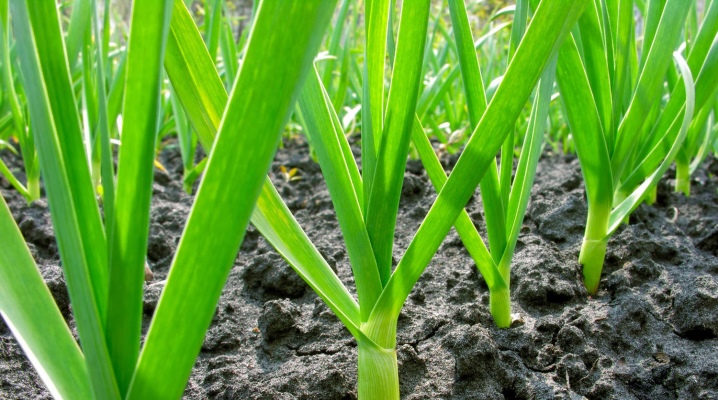
Garlic is not the most demanding crop, it develops well in various natural and climatic latitudes, does not differ in particular sensitivity to light and the quality of the substrate. However, if you are serious about your future harvest, you need to take some time to fertilize this beneficial plant. Ammonium is very popular among gardeners.
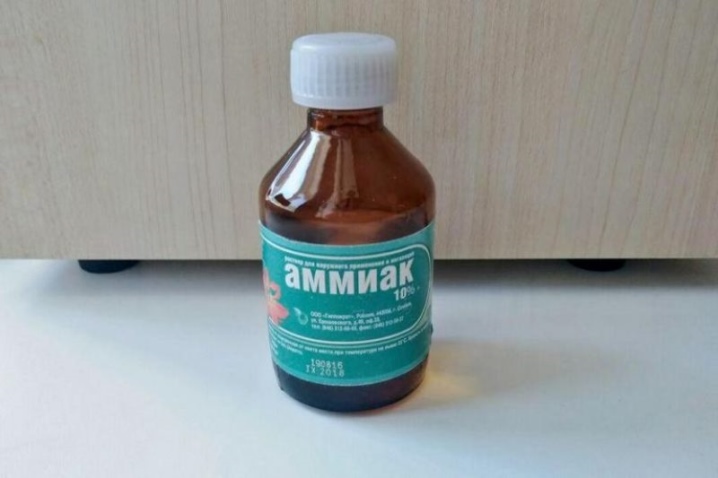
Advantages and disadvantages
For successful development, the garlic bush must increase the green mass, only in this case it will be able to produce chlorophyll in the required volume. It should bloom profusely - this will allow it to bud and form fruit. Therefore, garlic needs nitrogen, in conditions of a lack of this trace element, the vegetative mass of the plant begins to turn yellow and wither.
Despite the fact that nitrogen occupies 78% of the volume in the ambient air, only “select” crops, mainly legumes, can assimilate it from there. Everyone else gets it from the soil. Garlic is highly sensitive to the concentration of this substance in the ground, this is due to the peculiarities of its structure.
- The root system is fibrous, weak. Poorly developed roots are not always able to provide the plant with all the nutrition it needs. Useful substances should be located as close as possible to the surface of the substrate, only in this case they will be absorbed in full.
- Garlic lacks a pronounced division into root, stem and leaves, therefore all parts of the plant are interconnected. The deterioration of each of them negatively affects the others, so a lack of nitrogen will jeopardize a good harvest.
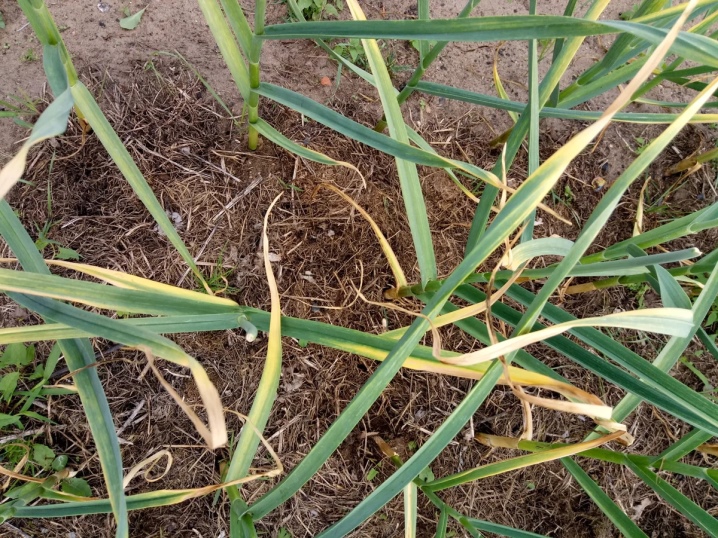
You can understand whether garlic needs root and foliar dressing with an ammonia preparation by the state of the green feather. If, with sufficient watering, the feathers still turn yellow, and the tips begin to dry, then your plant needs a portion of nitrogen.
Modern industry offers a wide range of nitrogen-containing fertilizers, but many prefer to use folk remedies in the old fashioned way. It is to this group that ammonia is referred to. Our grandmothers and grandfathers also used ammonia solution, it has not lost its relevance today. This is an affordable and relatively budgetary way to feed a bed of garlic with useful trace elements and at the same time prevent the appearance of insect pests.
You can buy the drug in every pharmacy, and it will take no more than a couple of minutes to make a composition for processing a culture out of it. Nitrogen is present in it in the form of ammonium nitrate.
This is an available substance, easily assimilated by plants, but at the same time it does not accumulate in its tissues.
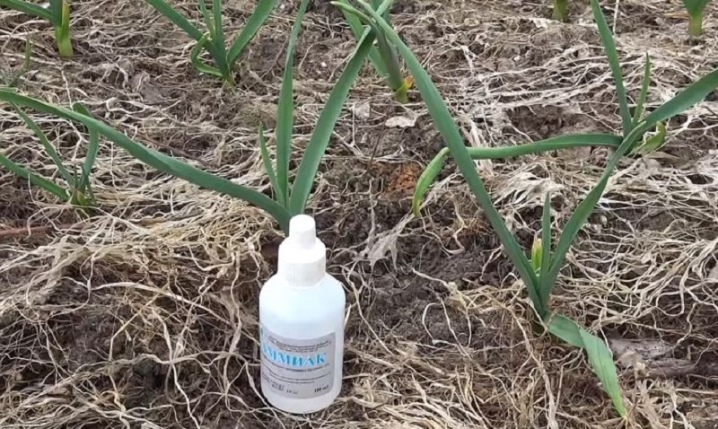
However, the beneficial effect of the drug does not end there. The ammonia has a rather specific aroma, thanks to which it repels insect pests. Ammonia has established itself as a reliable repellent against aphids, weevils and onion flies.
Thus, the following advantages of using ammonia for garlic can be identified:
- no accumulation of nitrates;
- ease of use;
- safety for people, plants and soil;
- nitrogen supplied by ammonia during root fertilization or spraying is in an easily assimilated form.
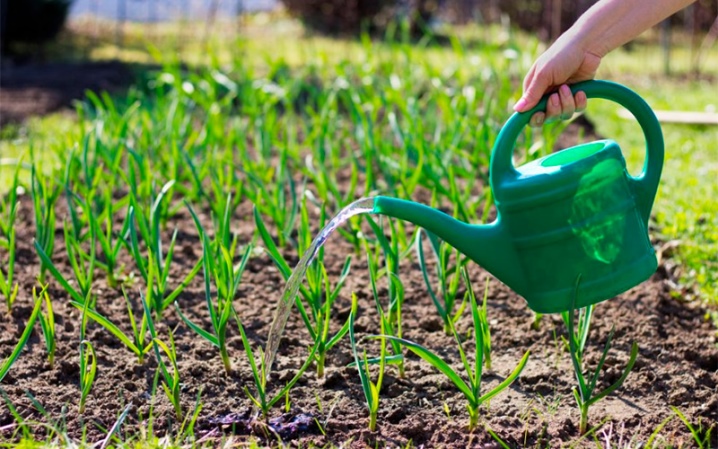
The ammonia solution does not change the structure of the soil and its acidity. It does not break down into heavy salts that poison the substrate.The use of the drug allows you to carefully care for the vegetable area without contaminating or overloading the soil. Ammonium nitrate is presented in a volatile form, so it is almost impossible to overfeed garlic with it. In addition, such a drug is cheap, and you can find it in every pharmacy.
The use of ammonia has practically no contraindications for feeding a garlic bed. Timely implementation of the procedure allows you to double the yield.
However, when processing plants, it is important to adhere exactly to the recommended dosages. Excess nitrogen nutrition contributes to the formation of vegetative mass, and this can deteriorate the quality of the crop.
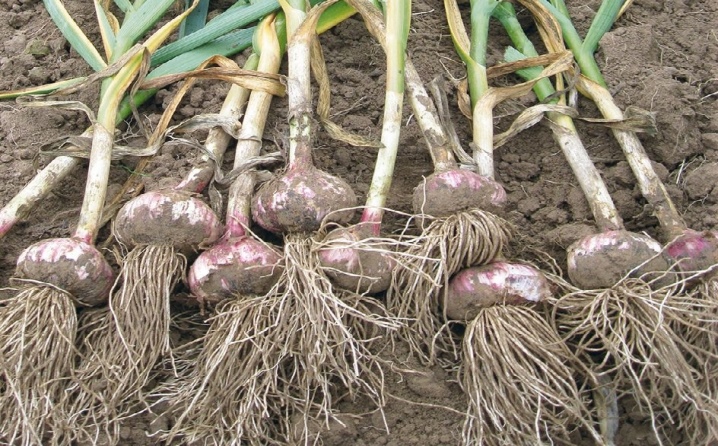
How to use
Top dressing
To fertilize garlic with an ammonia solution, it is necessary to prepare a nutritional composition - 15-20 g of 25% ammonia are diluted in 1 liter of water. This dosage is the maximum permissible, it gives an effect in early spring, immediately after the snow cover melts. For all subsequent treatments, the concentration of the drug is reduced.
- The very first treatment is carried out at the stage of soil preparation. To do this, a well-dug, moistened earth is watered with a solution of ammonia and water at the rate of 50 ml per bucket.
- The second feeding is needed when 2-3 permanent leaves appear - in this case, add 2 tbsp to a bucket of cool water. l. ammonia.
- Subsequently, in the summer, for prophylaxis, nitrogen fertilizing is carried out 2-3 times a month, while the concentration is reduced even more - during this period, only 1 tbsp is required for 1 bucket of water. l. ammonia solution.
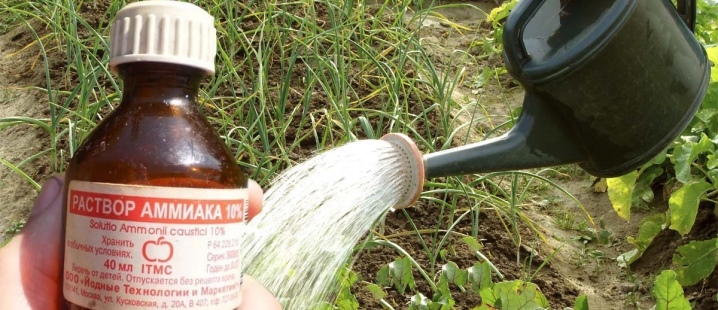
If the plant needs emergency help when its green mass begins to wither for no apparent reason, you can feed it with a solution at the rate of 60 ml of ammonia per bucket of water.
When feeding garlic, it is important to strictly adhere to the recommended application rates. Even in the most severe cases, when the feathers began to wither en masse, the dosage should not be exceeded, since concentrated solutions lead to burns of the plant roots. Remember that the cause of yellowness can be completely different - insufficient irrigation or pest activity.
A healthy plant with feathers of a rich dark green color does not need feeding even for preventive purposes.
It is important to take into account that an oversupply of nitrogen fertilizers is just as dangerous as their shortage.
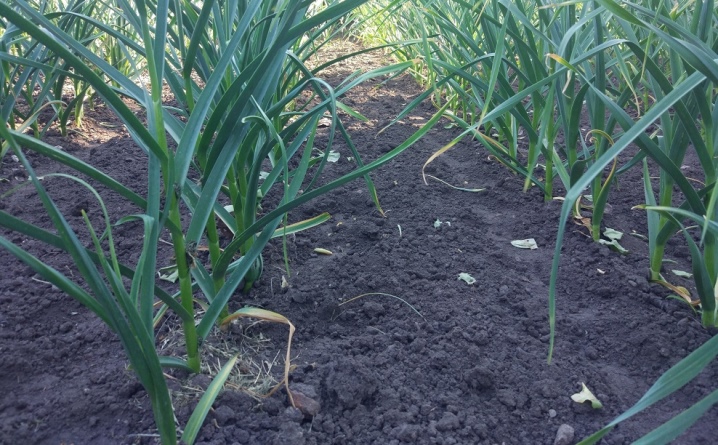
Pest control
The ammonia helps to ward off insect pests. So, root dressing is used when plants are damaged by a root nematode. In this case, for 1 bucket of water, you need to take 40 ml of ammonia and dilute 3 drops of iodine in this composition, the resulting solution is enough to process a garden with an area of 2 square meters. m. After feeding, be sure to irrigate the ground with plain water. To achieve the maximum effect after 10-14 days, the treatment is repeated.
When using foliar dressings, any soapy substance must be added to the working solution. It retains the active components of the drug on the surface of the leaf plates and thereby prevents the washing off of the active substance by dew or rain. In addition, the soap prevents the rapid breakdown of alcohol components.
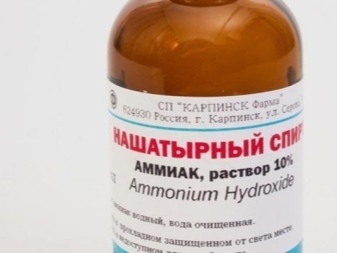
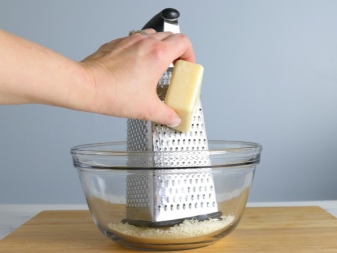
To prepare the mixture, 100 g of soap is ground on a grater and poured with a liter of hot water. When the soap shavings dissolve, a homogeneous pasty mass should be obtained - it is diluted in a bucket of cool water and 50 ml and 25% of ammonia are added there. The resulting composition is poured into a bottle with a spray bottle and sprayed on the green parts of the plant.
Please note that the prepared solution should be used immediately after preparation. Otherwise, all of its properties will be lost.
To combat ants, other proportions are used:
- a bottle of ammonia is poured into a liter of water and mixed;
- then the top layer of earth is removed from the anthill and the prepared solution is poured into it.
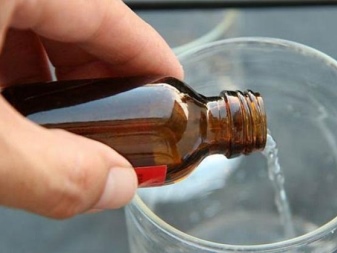
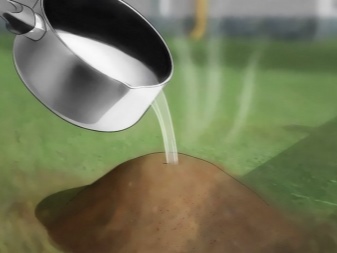
It is necessary to try to process the entire surface on which the clutch of insects and their females is concentrated.
To destroy onion flies in a bucket of water, dilute in 10 ml of ammonia and add 250 g of salt. The resulting composition is sprayed on the bushes. Insects do not tolerate the pungent odors of ammonia and quickly leave the beds. After such spraying, it is necessary to thoroughly water the garden with plain water. For prevention, it is advisable to repeat the event after 10 days.
To get rid of the wireworm, a solution is prepared at the rate of 10 ml of ammonia per 10 liters of water. The beds are plentifully watered with this composition every 2-3 days until the pest is destroyed.
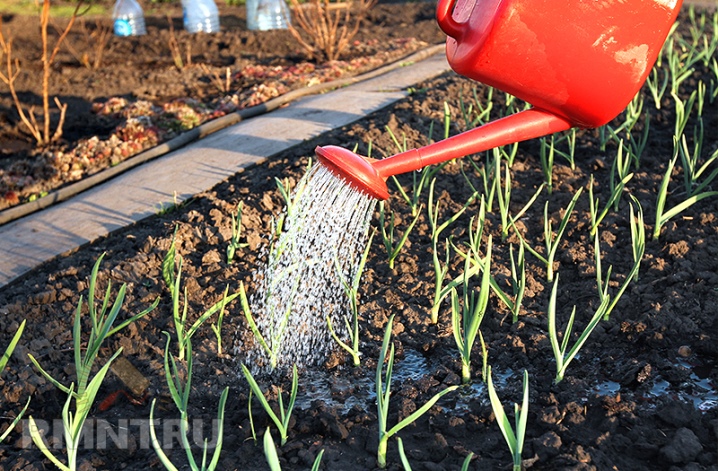
A composition of 25 ml of an ammonia preparation diluted in a bucket of water will help from the lurker. Processing is carried out from mid-May to late June.
When processing garlic with an ammonia solution, it is necessary to take into account the factors that influence the processing results.
It is correct to spray the green mass in the early morning, in the evening after sunset or in cloudy weather. Otherwise, under the influence of direct ultraviolet rays, the main active substance will instantly collapse, and the treatment will not give any result. It is also not recommended to carry out foliar dressing in rainy weather, in this case the drops of water will wash off the ammonia from the green mass. Top dressing of garlic with ammonia can be carried out only at a temperature of 10 degrees or more.
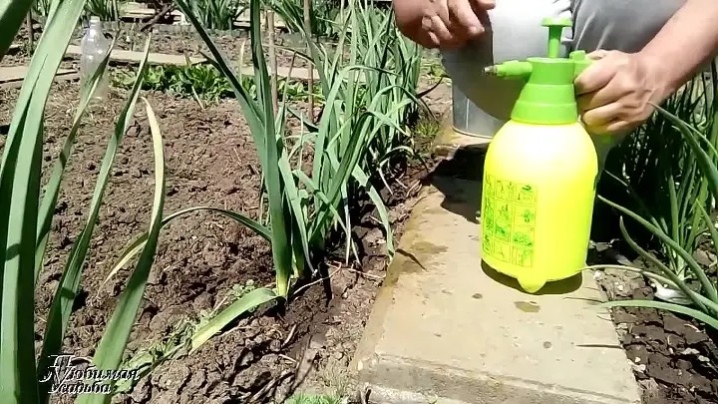
Useful Tips
Despite all the environmental friendliness and safety of preparations based on ammonia, when preparing and using a working preparation, you should still adhere to elementary rules.
- When making up a solution, ammonia is added to water and in no case is it the other way around.
- The vapors of ammonia are very volatile, they have a pungent specific odor, which, at high concentrations, can cause headaches and irritation of the mucous membranes. Therefore, you need to prepare a working preparation outdoors or in a well-ventilated area. It is advisable to use gloves and a respirator.
- It is not recommended to prepare the solution for people suffering from hypertension, since the vapors of ammonia can cause a sharp increase in blood pressure.
- Do not mix ammonia with chlorine-containing components, for example, with "Whiteness" or bleach.
- If the working solution comes into contact with the skin and eyes, a strong burning sensation occurs. The damaged area should be rinsed immediately with plenty of cool running water. If relief does not come, it makes sense to seek medical help.
- It is necessary to store ammonia in places inaccessible to pets, children and disabled adults, since with a sharp breath it can cause a reflex breath holding. In the case of ingestion in a concentrated form, the substance leads to burns of the oral cavity and esophagus.

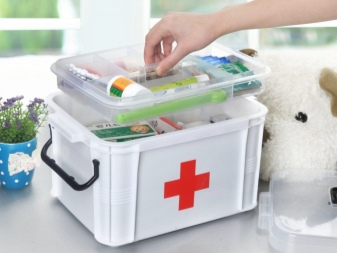
Let's summarize
- Ammonia is a rich source of nitrogen, which the garlic culture needs for proper growth, development and elimination of feather yellowing.
- Fertilizer has significant advantages in comparison with other types of nitrogen-containing fertilizers, since it allows you to get an environmentally friendly harvest. The big plus is that when using it, there is no accumulation of dangerous nitrates.
- It is a simple, affordable and highly effective product. The high result of its application is confirmed not only by positive feedback from experienced gardeners, but also by scientific research data.
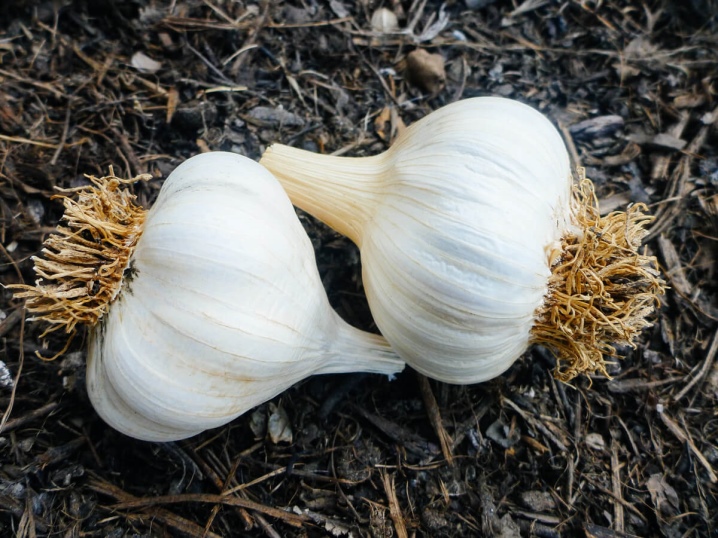













The comment was sent successfully.